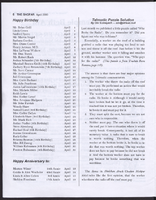Search the Special Collections and Archives Portal
Search Results
Joe Williams Music Scores
Identifier
Abstract
The Joe Williams Music Scores date from 1940 to 1991 and comprise the handwritten musical scores of American jazz musician Joe Williams, born Joseph Goreed. Many of the musical scores are Williams' original arrangements.
Archival Collection
Myram Borders Papers
Identifier
Abstract
The Myram Borders Papers (1965-1998) contain articles written by Borders, newspaper clippings, court transcripts, photographs, slides, agendas, meeting minutes, and a copy of the joint operating agreement between the Las Vegas Review Journal and the Las Vegas Sun. Also included are media kits for the Desert Inn Hotel and Casino and the Stealth Fighter Public Debut, an annual report to Sheriff John Moran concerning organized crime, and a copy of the MGM fire litigation.
Archival Collection
UNLV Libraries Collection of Hollywood Casino Corporation Promotional Materials and Reports
Identifier
Abstract
The UNLV Libraries Collection of Hollywood Casino Corporation Promotional Materials and Reports includes annual reports, prospectus, 10-K forms, 10-Q forms, equity reports, financial research, press releases, press kits, a stockholder meeting notice, and promotional materials for Hollywood Casino Corporation in Dallas, Texas, dating from 1992 to 2001.
Archival Collection
Jon E. Cobain Papers
Identifier
Abstract
The Jon E. Cobain Papers (1963-2009) contains material representing Cobain's experience as the first official graduate of Nevada Southern University (later University of Nevada, Las Vegas) in 1964. Materials include photographs of Cobain and his family, a scrapbook from his 1964 graduation day, newsletters, a copy of Beau's Bits Handbook, personal correspondence, and his diploma. This collection is comprised exclusively of digital surrogates.
Archival Collection
Stephen Nasser Papers
Identifier
Abstract
The Stephen Nasser Papers (1992-2018) mainly contain letters written from school children to Nasser who travels to schools, churches, and organizations around Las Vegas, Nevada to share his story of surviving the Holocaust during World War II. Materials in this collection document his captivity in various prison camps and includes photographs, awards, and newspaper clippings. Also included are speeches given by Nasser and book reviews and a teacher's guide of his book My Brother's Voice written by students of Dixie College, St. George, Utah. This collection includes a copy of
Archival Collection
North Las Vegas Chamber of Commerce Records
Identifier
Abstract
The North Las Vegas Chamber of Commerce Records documents the activities of the North Las Vegas Chamber of Commerce in southern Nevada from approximately 1970 to 2007. The majority of this collection is comprised of photographs and scrapbooks documenting North Las Vegas Chamber of Commerce member events. The collection also includes business guides, event invitations, and issues of the organization’s monthly newsletters,
Archival Collection
River Mountains Trail Partnership Records
Identifier
Abstract
The River Mountains Trail Partnership Records date from 1995 to 2015 and document the planning and construction of the River Mountains Loop Trail in Clark County, Nevada. The collection contains meeting agendas and minutes, correspondence, project notes, trail maps, land surveys, grant applications, photographic slides of the trail and Lake Mead, environmental assessments, ephemera from National Trails Day, trail guides, interpretive plans, and development reports.
Archival Collection
Aaron Williams Photograph Collection
Identifier
Abstract
The Aaron Williams Photograph Collection (approximately 1968 to 1983) consists of three black-and-white photographic prints. Two of the images are of the groundbreaking ceremony of the Senior Citizens’ Center with Las Vegas, Nevada Mayor Oran Gragson, and the third of three unidentified individuals.
Archival Collection

Emilia Marquez oral history interview: transcript
Date
Archival Collection
Description
Oral history interview with Emilia Marquez conducted by Maribel Estrada Calderón on July 5, 2019 for the Latinx Voices of Southern Nevada Oral History Project. Claytee D. White and Emily Lucile are also present during the interview. Emilia Marquez was born in the United Stated and raised in Alexandria, Virginia, where her father worked as a bricklayer, until the age of twelve, when her father decided to move the family back to Uruguay. She describes acclimating to her new life in middle school and her shift from being perceived as an outsider in Uruguay to accepting Uruguay as home. She describes life in Uruguay and the positions that her family held while living there. After meeting and marrying her husband they trained to work in a casino. She trained as a slot machine operator, and her husband trained as a dealer. This eventually led them to leave Uruguay for the U.S. After the encouragement of her father and mother, she moved with her mother to Las Vegas to work in the casino industry. She describes working as a change person at the Luxor before moving to the newly opened Palms, where she worked until she left it to work at the Wynn. She ends the interview talking about various Uruguayan dishes and traditions, and a brief history of Uruguay. Subjects discussed in this interview: Uruguay, immigration, Las Vegas Strip, Latinx, Luxor.
Text

